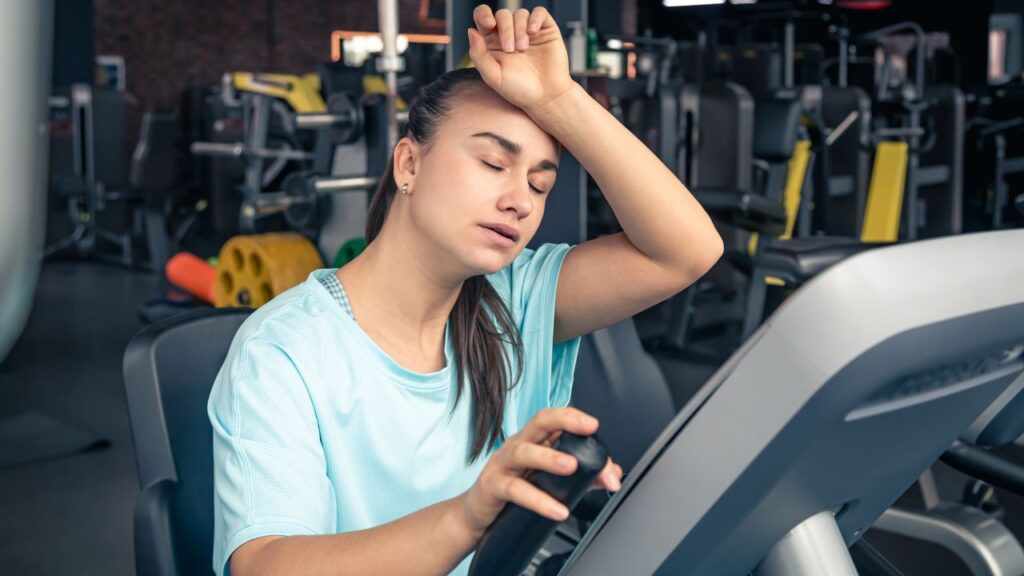Have you ever wondered, “{Why do I feel weaker in the gym}?” We’ve all been there, facing those days when the weights seem heavier, and the energy feels drained. This blog post aims to delve into the depths of this phenomenon, offering insights, strategies, and empowerment to break free from the chains of weakness.
The Psychological Battle: Mind Over Matter
The mind holds immense power over the body. Often, feeling weaker in the gym is a result of psychological barriers. Anxiety, stress, or a negative mindset can sabotage your workout. Recognizing and addressing these mental hurdles is crucial to unleashing your full potential.
To conquer the psychological battle, engage in mindfulness practices, like meditation or visualization. By fostering a positive mindset, you can transform your gym experience and redefine what your body can achieve.
Nutrition: Fueling the Fire Within
Adequate nutrition is the cornerstone of optimal performance. {Why do I feel weaker in the gym} could directly result from insufficient fuel for your body. Pay attention to pre-workout nutrition, ensuring a balance of carbohydrates, proteins, and fats to power your muscles and sustain energy throughout your session.
Consider incorporating a high-quality pre-workout supplement into your routine. These supplements are formulated to provide a potent blend of nutrients that can enhance your workout performance and combat the feeling of weakness.
Overtraining: The Silent Saboteur
Sometimes, the answer to {why I feel weaker in the gym} lies in the intensity and frequency of your workouts. Overtraining can lead to physical exhaustion, muscle fatigue, and a decline in performance. It’s crucial to balance pushing your limits and allowing your body to recover adequately.
Integrate rest days into your routine and prioritize recovery strategies such as stretching, foam rolling, and adequate hydration. Listen to your body’s signals and adjust your workout intensity accordingly.
The Power of Hydration
Dehydration is a silent contributor to weakness in the gym. Even mild dehydration can impair bodily performance and leave you feeling fatigued. Prioritize adequate hydration throughout the day, especially before and during your workout.
Consider incorporating electrolyte-rich beverages to replenish essential minerals lost during sweating. Staying properly hydrated ensures optimal muscle function, helping you combat the feeling of weakness and push through challenging workouts.
Environmental Influences on Workout Performance
External factors like the gym environment can significantly impact your workout performance. Poor ventilation, crowded spaces, or distracting noises can create a less-than-ideal setting for an effective workout. Identify environmental triggers that may contribute to your feeling of weakness.
Optimize your workout environment by choosing less crowded workout times, listening to motivational music, or even considering outdoor workouts. Creating a positive and conducive atmosphere can enhance your focus and performance within the gym.
Mastering the Basics: Form and Technique
Sometimes, the most straightforward explanations hold the key to {why I feel weaker in the gym}. Poor form and technique during exercises can compromise muscle engagement and lead to premature fatigue. Mastering the basics of each movement is essential for maximizing strength and preventing unnecessary strain.
Prioritize proper form over lifting heavier weights. Consult with a fitness professional to confirm you’re performing exercises correctly. By refining your technique, you can target muscles more effectively, enhancing your strength and overall gym performance.
Sleep Quality: The Foundation of Strength
Quality sleep is the unsung fitness hero and can significantly impact {why I feel weaker in the gym}. During deep sleep, the body undergoes crucial repair and growth processes essential for muscle recovery. Poor sleep quality can disrupt these processes, leaving you with decreased energy levels and strength.
The Role of Genetics in Fitness
Genetics determines our physical abilities, including strength and endurance. While you can’t change your genetic makeup, understanding your unique traits can empower your fitness journey. Instead of fixating on perceived weaknesses, focus on optimizing your genetic potential.
Tailor your workout routine to align with your body’s strengths and weaknesses. Celebrate your progress and achievements, recognizing that everyone’s fitness journey is unique. By embracing your genetic blueprint, you can cultivate a positive mindset and overcome feelings of weakness in the gym.
Supplementation Strategies for Enhanced Strength
Supplements can be valuable allies in your quest to understand {why you feel weaker in the gym}. While a well-balanced diet should be the foundation, certain supplements can provide targeted support. Consider incorporating creatine, a powerhouse supplement for boosting strength, muscle mass, and overall athletic performance.
Harnessing the Power of Positive Affirmations
The mind-body connection is a potent force in fitness. Positive affirmations can be a game-changer when combating {why I feel weaker in the gym}. Transform negative self-talk into empowering statements that reinforce your strength and capabilities.
Create a list of personalized affirmations related to your fitness goals. Repeat these affirmations daily, especially before your workouts. By fostering a positive internal dialogue, you can cultivate a mindset that propels you past perceived limitations and into a realm of newfound strength.
Understanding Delayed Onset Muscle Soreness (DOMS)
Delayed Onset Muscle Soreness (DOMS) is joint after intense or new workouts. It can leave you feeling temporarily weaker in the gym as your muscles recover from the microtrauma caused by exercise. Acknowledge the role of DOMS in your fitness journey and develop strategies to manage it effectively.
To alleviate muscle soreness, incorporate active recovery techniques, such as light cardio, stretching, or foam rolling. Gradually progress in intensity to allow your muscles to adapt and minimize the impact of DOMS on your overall gym performance.
Social Comparison and Its Impact on Motivation
The age of social media has brought about a new challenge in fitness: constant comparison. Seeing others’ seemingly flawless workouts or impressive gains can contribute to feelings of inadequacy and weakness. Shift your perspective on social comparison to fuel motivation rather than hinder progress.
Focus on your journey, celebrating your achievements and progress. Use others’ success as inspiration rather than a measure of your worth. By cultivating a healthy relationship with social media, you can harness its motivational power to propel you forward in your fitness endeavors.
The Influence of Age on Physical Performance

Age is a natural factor that can influence physical performance. Muscle mass tends to decrease as we age, and joints may become more susceptible to stiffness. While age-related changes are inevitable, proactive measures can mitigate their impact on your strength in the gym.
Incorporate flexibility and mobility exercises into your routine to maintain joint health and range of motion. Adjust your workout intensity and focus on functional movements to accommodate age-related changes. Embrace the wisdom that comes with age, recognizing that your fitness journey is a lifelong evolution.
The Impact of Chronic Stress on Physical Performance
When the body is constantly stressed, cortisol levels can remain elevated, leading to muscle breakdown and decreased energy.
Implement stress management techniques like breathing exercises, meditation, or hobbies that bring joy. Prioritize self-care to mitigate the impact of chronic stress on your overall health and fitness. By fostering a balanced and resilient mind, you can reclaim your strength in the gym.
Balancing Cardiovascular and Strength Training
The balance between cardiovascular and strength training is crucial for overall fitness. Overemphasizing one aspect at the expense of the other may contribute to feelings of weakness. Strike a harmonious balance between cardiovascular exercises and strength training to optimize your performance.
Incorporate both modalities into your routine, ensuring a well-rounded approach to fitness. Cardiovascular exercises enhance endurance, while strength training builds muscle and power. By finding the proper equilibrium, you can break free from the confines of weakness and embrace the full spectrum of your fitness potential.
Personalizing Your Workout Routine
Generic workout routines may not address your unique strengths and weaknesses, leading to feelings of inadequacy.
Experiment with different training styles, find activities you enjoy and modify workouts to suit your needs. Creating a personalized workout routine empowers you to excel in the gym and overcome the barriers contributing to feeling weaker.
Harnessing the Motivational Power of Music
Music can influence our emotions and motivation, making it a potent tool in combating {why I feel weaker in the gym}. Create a playlist of energizing tunes that resonate with your workout style and preferences. Let the beats fuel your determination and elevate your performance.
Experiment with different genres and tempos to find what inspires you most. Music is a powerful motivator to enhance focus, intensity, and enjoyment during workouts. By harnessing the motivational power of music, you can turn moments of weakness into triumphant victories.
The Role of Flexibility in Physical Strength
Discussions of strength and muscle mass often overshadow flexibility, yet it plays a crucial role in overall physical performance. Limited flexibility can hinder your range of motion and contribute to feelings of weakness. Integrate dynamic stretching and flexibility exercises into your warm-up and cool-down routines.
Yoga and Pilates are excellent practices that enhance flexibility while promoting balance and core strength. By prioritizing flexibility, you can optimize your body’s mobility and function, reducing the likelihood of feeling weaker in the gym.
Breaking the Monotony: The Power of Variety
Monotonous workout routines can lead to boredom and a perceived decline in strength. Spice up your workouts by introducing variety into your exercise regimen. Explore different training modalities, such as CrossFit, HIIT, or functional training, to keep your workouts engaging and challenging.
Change your workout environment, try new equipment, or join group fitness classes. Surprise and novelty can reignite your enthusiasm for exercise, dispelling feelings of weakness and transforming your gym sessions into dynamic and invigorating experiences.
Setting Realistic Goals for Sustainable Strength
Unrealistic expectations and unattainable goals can contribute to feelings of inadequacy and weakness. Set realistic and achievable goals that align with your current fitness level and aspirations. Break down larger goals into smaller milestones, celebrating each achievement.
Regularly reassess and adjust your goals to accommodate your evolving fitness journey. Setting realistic expectations fosters a sense of accomplishment, motivation, and sustained strength in the gym. Embrace the journey, acknowledging that progress is a continuous and fulfilling process.
Embracing Cross-Training for Holistic Fitness
Cross-training involves incorporating various exercises and activities into your routine, promoting overall fitness, and preventing burnout. Embrace cross-training to target different muscle groups, enhance cardiovascular health, and maintain a well-rounded fitness profile.
Include swimming, cycling, or recreational sports to complement your strength training. Cross-training prevents boredom and allows specific muscle groups to recover while others are active. By adopting a holistic approach to fitness, you can address the multifaceted nature of {why I feel weaker in the gym}.
The Impact of Weather on Workout Performance
Weather conditions can influence your workout performance, contributing to feelings of weakness. Extreme temperatures, humidity, or seasonal changes may affect your body’s ability to regulate temperature and exertion. Stay hydrated in hot weather, dress appropriately for cold climates, and be aware of potential weather-related challenges.
Conclusion – Empowering Your Fitness Journey
In conclusion, the quest to understand “{why do I feel weaker in the gym}” is multifaceted, encompassing physical, mental, and environmental factors. You can reclaim your strength and redefine your fitness journey by addressing sleep, nutrition, mindset, and other vital elements.
Remember, fitness is a dynamic and evolving process.




